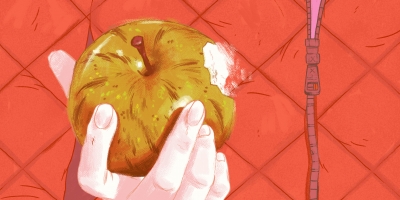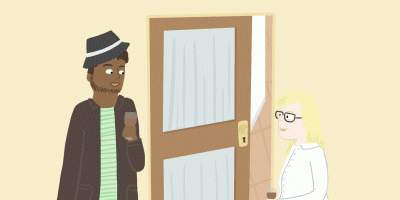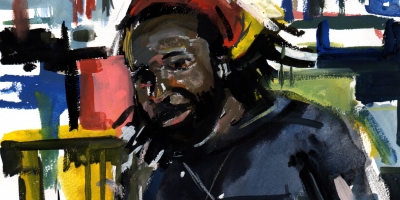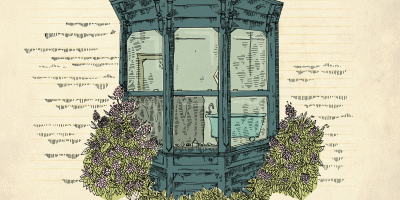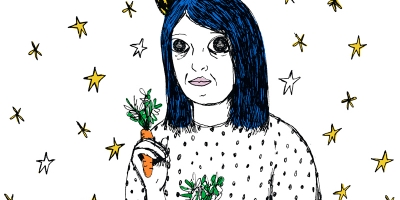Fiction
Hearst Castle is a Home
by Alexis Zanghi

The girl was all beams and joints that didn’t meet. Her bony ankles nestled above a pair of blue suede moccasins, white rubber bottoms stained green and gold, smelling of sulfur. Without saying a word to her, Chuck Welcome hopped out of the truck’s cab, tucked the door behind him like a dance partner at the end of a song. He pulled a spare tire from its bed, caked with last year’s leaves.
The sky above us was bright as it had ever been. The girl followed Chuck into our yard, passing by the chicken coop and through the curtain of blankets that had dried in that day’s sun.
Chuck paced in a circle over the mound like an animal lying down for the night. There was something feral about Chuck that couldn’t be reconciled with much beyond the gate. Beyond our beams and walls and windows and the rambling crabgrass and wilding hedges on the Avenue, everything Chuck did was a negotiation.
“You can see the sky here. I didn’t think you could in the city.” Her voice pooled low and warm like thick curtain on carpet. She smiled like Chuck did, with drawn lips and waxing cheekbones.
Chuck held his breath, bowed his head, and tossed a rough rope over the bough of the oak tree. The mound fell between two trees, planted by the original owners, the builders, to bring prosperity. The whole house, all of us, had been strung together in a series of devotionals.
One tree remained on the property, another had been parceled off with the rest of the land with the crash. Chuck patted the tire, and invited his newest passenger to nestle inside the swing.
All the sisters were always a knob shy, but that was the way Chuck liked them, as far as we could tell. The rope was about as thick as her wrist. She wrapped a small hand around it, kicked her legs out, pushed her eyes up from the ground, past the attic and the turrets, up to the sky. Chuck hummed the first few bars to the song we had heard before.
“Is that your own song?” the girl asked, not taking her eyes off the sky.
“Nope-nope, it’s the blond bird song,” Chuck said, eyes on the mound, smiling with his eyes open and his mouth shut. It was a face we knew was only for the new ones.
“Well, how does it go?”
“Listen and you’ll learn, darlin’.” His voice was short of a sigh, a foreman with a new apprentice. “Kookaburra sits in the old gum tree-ee, merry merry king of the bush is hee-ee. Laugh! Kookaburra, laugh! Kookaburra, gay your life must be.” Chuck’s singing voice was the sound that floorboards make under footfalls, the creak of branches in a strong breeze, but it wasn’t as strong as the sound of the wind made by the girl’s small body.
He pushed on the girl’s contracting speckled shoulder blades, and she settled into the tire, bones falling into each other, legs pushing higher. The girl parsed out the sky above us, and Chuck followed her eyes to the constellation with the brightest stars. “That’s not Orion, kiddo. Everyone says it is, but it isn’t.” Chuck had a way of building worlds, of rewriting rules and geographies and constructing his own peculiar vocabulary, and it was this that kept so many women with him. When they left—if they left—they only knew his language.
“Wee-eeelllll…” The girl drew out the word as she swung back and forth, making it a sentence unto itself. “What is it?”
“It’s got a lot of names. But I call it the mansion.” Chuck hummed a few bars from the song, pushed the girl hard, her head cresting above the brightest star in the sky, eclipsing the light he’d kept lit in the attic for two years now.
When she kicked her way back to Chuck, he didn’t push down on those shoulders. Instead, he caught her beneath her ribcage, pulled her close. He wanted to know how small her waist felt, pressed against his stave of a sternum. She crumpled into him, joints and beams and sinews falling still against his barrel chest. Her tissue-paper T-shirt brushed against the blisters on his lips. All they could hear was the mosquitoes and the traffic from the Boulevard.
Chuck Welcome led Sara Beth inside. The height of the ceilings pulled at her first, the way the stairs arched up and off from back to front. She passed under the doorway and over the linoleum, through arches and between the stairs. Her eyes stayed fixed on the ceilings, following the banisters and chandeliers up all three of our stories. Chuck had scrubbed them clean long ago.
Chuck plucked from his pocket the skeleton key, long and delicate, its scrolls green with use. He inserted it gently into the folds of the parlor’s double doors.
Sara Beth stretched out over the linoleum. Her toes slid over the ridges in the flat plastic, to the part Chuck had stripped to reveal wood. A bare bulb clamped on to a dead-wired, broken-brass candelabra, and it was with this that he brought light back into the parlor. He knelt by the fireplace, motioned for the girl to join him. When she went onto her knees, too, he took her hand and kissed it, then put his finger to his lips and tapped her shoulder.
“Wait here,” he told her. The girl put her eyes to the charred fireplace. Chuck returned with a pile of blankets from the dumbwaiter and placed them in the window seat. He fussed over the blankets, unfolding them, pushing them into the cracks where the seat met the sill, smoothing them over. “I’ll build you a bed, darlin’, but this’ll have to do for now.”
“When?”
“Soon-soon,” he chirped. With Chuck, soon-soon could mean a day, or a year.
Chuck Welcome turned out the light for Sara Beth. When he crossed over the hallway threshold, he found Ginny in his bed, still but not sleeping.
He swallowed the previous evening’s leftover whiskey and rubbed the day’s salt from his chest with a towel. He pushed up the window, pissed in the bushes, and slid into bed with silent satisfaction.
“I thought you didn’t need another,” Ginny said. She lay flat on her stomach on Chuck’s bed, facing out the window into the dry light of morning. The thick honeysuckle smell outside rankled her nose. She flipped over onto her back, her small breasts angling toward the ceiling. It was a maneuver that had brought Chuck on top of her, ended arguments, alleviated boredom. Now it failed to raise even one of Chuck’s brows. She sighed and blew a strip of mahogany hair from her face.
“I thought we would each have our floors,” she said, her voice a little louder. Chuck continued to stare at the ceiling, blinking like something was stuck in his retina. Against precedent’s grain, Ginny kept going, her voice steady. “I can share the second floor, or she can have my place and I can sleep on the first.”
Chuck shook his head from side to side, grunted in disagreement. He pulled himself up from the bed, turned his back to Ginny, placed both browned feet on the floor.
“What if she went to the att-“
“Ginny.” Chuck pushed the heel of his hand against the lock of the window, opening it. A wayward hydrangea branch flopped in. Chuck pushed it aside. He picked through piles of seashells and pebbles he had collected from the job site for a purpose that remained unclear to us, and likely to him as well. He pulled a smooth gray stone from the pile, the size of a doorknob and as thin as a pane of glass. He turned to face her with a shirtless barrel chest she’d once used as a pillow. Already, his skin was the color of butcher paper in the sun.
He drew his breath in, and with each rule he tossed the stone up, then caught it with his left hand.
“We share this place. We don’t go to the attic, we don’t step on the mound. You live on the second floor, you relieve yourself there and clean yourself here, and you tend to the chickens and the soil.”
He paused to see that Ginny was listening. She had turned over onto her side and curled her shoulders around herself, but she watched the stone Chuck held in his hand. The hand bore the tattoo of an hourglass and when Ginny had asked him why he had it, he’d told her that he wished he could scrub all the tattoos from his body, showed her the one on his calf that he’d half-burned off. She asked fewer questions.
Chuck continued. “Ginny, I’m your brother and your lover and Sara Beth isn’t a sister like you are yet, but she will be. You’re older now, she isn’t. You knew you weren’t the only one when you came here.”
Ginny’s shoulders stayed curled as she pulled herself up from the bed and slid her wide feet out to the parquet. She was taller than Chuck, or had been, once, but walked like a broken reed around him, like the plaster in the ceilings pushed against her head. She wrapped herself in the satin sheet that she’d found for them at the market on the Boulevard. She took to the shower, standing in the middle of the claw-foot tub that Chuck had installed in the middle of his quarters. There was no curtain for it, just a pipe epoxied onto the enamel. Chuck was unmoved while Ginny scrubbed her armpits with a gray hunk of soap.
“All right?” Chuck confirmed. A silver cowlick stuck straight up from his forehead, his black eyes were wide and wild.
“I’ll turn the soil today,” Ginny replied.
“All right. Show her how to beat the blankets, too. They look like they could use one more turn.”
Ginny flinched under the cold water. Chuck pulled the previous workday’s clothes back on and shut the door behind him.
Before Chuck, we had been subject to scrappers and to storms, watched our land parceled and partitioned, new buildings constructed around us, old ones vacated. Shutters fell off our sides, bits of molding came loose. The paint had peeled in patches, so that we were naked in streaks. The porch had pulled apart, like it couldn’t stand to be together anymore.
One night, before Chuck, men came to strip us bare. They rapped on the pipes with meaty knuckles, prodded them with rough fingers, looking for something soft and yielding in the black. The floorboards whined and the packed dirt that formed our basement gave way. It was the first time a flood came inside us.
Chuck bought us at the auction with money he carried in a duffel bag the color of his hair and has tended to our bones ever since. He pushed the pieces of our porch back into each other, rejoined them with caulk and cement. He dusted the walls and chandeliers with his T-shirts, lit candles in buckets of gravel, lived on bagged potatoes.
There had been others before her, and others that left, and part of Chuck’s favorite, the blond bird, hung heavy over us, over all of us. These sisters lived out their lives with Chuck with an unknown absence made palpable. But it was Ginny who had planted seeds, gave the chickens a coop and farmer’s feed rather than scavenged bits of bread. Chuck could salvage a whole world from a relic, but Ginny could grow one fresh from the ground.
The nights were becoming harder for Chuck. More than once, he shook and twitched for minutes at a time in his bed and onto the floor. With Sara Beth or Ginny curled by his side—never both at once, because that was, as Chuck said, “a young man’s game”—he would run his rough fingers over the smooth growth at the nape of his neck. He’d grown his hair out and taken to wearing undershirts to hide it from Sara Beth and Ginny. It wasn’t like him.
Chuck demanded a nurturing from the women who came to stay in the stew-gray house. Like an animal playing dead, Chuck played weak—just for that minute, just for that night, just to elicit that reaction. It was a game, the inverse of a puppy mouthing at its littermate.
But unlike the sisters, the lump on Chuck’s neck was a growth he couldn’t contain. It was something he couldn’t control or manipulate or make wild or cut down. It was there, rising, moving up and down his vertebrae, pushing against his pillow. While Sara Beth’s sleeping mouth grew moist on his chest hairs, Chuck held his breath.
The moon and the streetlamp met on the bedspread, crossing Sara Beth’s body with slivers of cool white and electric orange. Chuck ran his gnarled fingers across the expanse of her shoulders once more. His nails were so worn they sat nearly convex in their calloused beds. He counted Sara Beth’s freckles, which had fluctuated and multiplied with the season. By July, she’d assumed most of Ginny’s duties, from beating the blankets to cracking Chuck’s beers. Her cheesecloth skin had turned olive, the freckles more than doubled.
Sara Beth stirred. He’d scratched her again, by accident. Sometimes this happened when he was inside of her, and her crying out made it harder for him to stop.
He wouldn’t let anyone but himself cut his hair, hadn’t paid taxes in years. When a tooth grew infected, he tied a piece of slack twine to it and made Ginny slam a door to pull it out. Chuck pulled himself from the bed, ran cold water into the tub, splashed it on his face. He considered giving the lump similar treatment. Its proximity to the spine made it undesirable, but as his fingers ran over it in the street shade and the moonlight, and a clean straight razor made its presence known, Chuck figured it was as good a time as any and sat as upright as he could in the bathtub. Water and blood fell together beneath the running faucet.
But this wouldn’t be like the tooth. Nothing in us, or in Chuck, could shake this. His black eyes glossed he set the razor to one side, propped his head on a towel, let the wound bleed out and his eyes roll and his body shake soft, then louder. The lump was too deeply rooted.
Chuck awoke to the scent of burning steak and the sight of Sara Beth cooking in his T-shirt. Sara Beth was young enough to be excited by the prospect of a hurricane, old enough to feign indifference. In her efforts to assert competence, she insisted on cooking off steaks in advance of its arrival. Outside, Ginny secured the chicken coop. “We have to let the hurricane blow through,” she shouted through an open window.
He laughed at both of them, Sara Beth fussing and failing with a frozen eye of round, Ginny’s quick, jerking motions to secure the birds in the yard. As the steak smoke settled, Ginny turned inside, leaving the back door open. She pulled plates from the dumbwaiter, set the radio in the middle of the table. Each plate bore the name of a place where we’d never been, where she’d never been: Hearst Castle, Bar Harbor, the Cloisters, “Vermont’s Covered Bridges.” The world grew small around all of us.
She set four places at the table. Because the parlor was Sara Beth’s now, because the dining room was filled with Chuck’s books, the kitchen was now in the hallway, and they ate in its middle, at a long, low table. In the mornings, the stained glass would cast colors upon their milk, meat, and potatoes. Chuck’s plate, “Vermont’s Covered Bridges,” rested at the head of the table in the middle of the hallway, between the two stoves. The need for this was acute: Chuck would not eat without it. We had heard him tell first Ginny, then Sara Beth, that food did not taste as good on the other plates.
The blond bird’s setting, Hearst Castle, was placed across from Chuck, with the usual offering: a slice of toast placed upon the silhouette of La Cuesta Encantada.
Sara Beth arranged her food on her Bar Harbor plate—vegetables on water, meat and starch on rock. It made her chew slower, made her breathe through her high nostrils in search of the scent of salt.
Ginny untied the sweatshirt from around her waist and pulled it over her head. Sara Beth was naked except for Chuck’s T-shirt, and Ginny rubbed her own snubbed nose. It was a trophy for Sara Beth, a trophy Ginny had once held between her own legs and bore on her skin, we had seen it. All a woman in Ginny’s position could feel was a sting on her skin, a swallow in her throat, and a new vacancy in her belly. She set a plate for herself last, the towers of the Cloisters.
The rain began to well inside of us. The lead pipes that had been left behind had been epoxied again and again at their breaks. We felt a pressure—from the breaking inside and from the wind outside—that nothing could relieve. There was hurt on the parts of us that were most tender.
Outside, the Avenue was quiet and the sky went from a pigeon’s feather to soot. Ginny, Sara Beth, and Chuck Welcome all sat down to breakfast, wind finally cutting the smoke.
“Should we bring the hammock inside?” Ginny asked.
Chuck snorted through his nose, hummed his quick “hmm-hmm”—a noise suggesting he’d briefly considered the same idea himself—and shrugged. He laid both his palms out on the table, open, as though he were reaching for the sisters’ hands. Ginny set her chin between her shoulders, eyes open. Sara Beth smiled with her closed eyes, both sets of hands folded between narrow hips.
“Thank the water and thank the sky, that the bounty that comes from on high, from down below and under the trees, thank the ground and thank me.”
“Grace!” shouted Sara Beth that pinged across the ceilings.
“Grace,” chimed Ginny in a half-whisper that settled on the carpets.
The blond bird pushed the toast back and forth, then we felt her footfalls on the same soft carpets that had trapped Ginny’s voice.
“Ginny, hup-hup.”
While Chuck closed his scrutiny on Ginny, Sara Beth pulled herself higher atop the stack of fruit crates where she perched. The blue gas on the stove stopped warming the steaks, leaving a canned odor in its wake. Leaves whipped through the hallway, striking our ceilings, sticking in cracks. The pipes groaned again. The sisters tied their hair to the tops of their head in unison.
“My brother, my lover,” Sara Beth said, tilting her head toward Chuck, extending her hand forward, palm open. He didn’t take it. Chuck rose, moving toward the doorway to greet the storm.
Chuck’s eyes went first, wild and rolling. His legs kicked out, his arms twitched. Ginny caught his thick head with her arm before it could hit the door. She lowered her body down with his, onto the hallway floor, slipped her hand beneath his tongue, turned his head onto its side. Sara Beth stood over them, bent at the hips, about to peck at the ground.
“Time it,” Ginny instructed. There wasn’t any urgency to her voice. She watched Chuck like she did the weaker hens.
“I don’t—”
“Listen to the song on the radio.”
Ginny’s arm was bloodied from catching Chuck’s head. The wound from his bathtub operation had opened, and Chuck had bitten her and his own tongue. His blood and spittle and sweat mixed with the rain, spattered the floor and her sweatshirt, made her look like she’d experimented in midwifery. When Chuck’s pupils reemerged, her hand was stroking the cut that rested above the lump. She drew her breath in between her teeth. His eyes focused on her, then he pulled back into the floor.
Sara Beth shut the gas off, put the plates in the sink, did what she knew to do. She began to pour Chuck a drink, but Ginny waved it away. She propped Chuck up with her bloodied arm, and settled her hand on the lump.
“Let’s get you inside.”
The Avenue was silent then. Ginny shut the door to Chuck’s room behind her, and Sara Beth opened the door from her own.
“Four minutes,” she said.
When Welcome awoke, he grabbed his tool bag and took a thousand dollars in cash from the bag in the basement, and went out the front door to the truck, passing over his pushed-together porch. He’d never have any more than he had that day, with the women around him and the blond bird like she’d never left him and the water rushing out of us and over the floor. His beams were broken then.
Ginny and Sara Beth spent a week eating two-minute eggs from the henhouse in silence. Ginny had nothing to do after Sara Beth came. Sara Beth had learned Ginny’s tasks as soon as she taught them to her, and Ginny’s role shrank as Sara Beth became better trained. When Chuck took her as his sister—she’d had no brothers before him, we were all sure—it was clear that Ginny’s time in the house on the Avenue would be done soon.
It had taken her and Sara Beth two days to open his doors. The task had united them toward a common goal, as neither one proved able to crack the lock by herself. Ginny had scrambled up to the bay window on the north side of Chuck’s room, then slammed the heel of her palm through the glass and crawled inside. Sara Beth waited on the other side, ready with a broom to sweep it. They found Chuck’s bed stripped and his things gone. Neither Sara Beth nor Ginny had words. After agreeing that they would tell Chuck that there had been a break-in, they retreated to their separate quarters. Neither was comfortable, but Ginny started standing taller within days of Chuck’s departure.
Ginny pulled the Cloisters from the dumbwaiter and pushed it into a canvas rucksack along with the sheets. Her skin was marked dark around her tank top from a summer spent in the sun. She still bore bruises from where the seizing Chuck had slammed her arm into glass. She was marked with the house, with Chuck, with the land outside, and she had nothing to show for it but few cuts and bruises and scars. She waited for the lights from the street to dim. She wanted her carrots back, eggs from the henhouse, cabbage from the ground. She slung the canvas over her wide back, stretched it tall, padded down the north stairs to the kitchen. She shut the door behind her slowly, ever mindful of Chuck’s aversion to noises. She had built her life out of the devotional, and now, its object was absent.
The honeysuckle was gone, the mosquitoes had stopped humming. Knees down in the earth, Ginny pulled carrots and cabbage and potatoes from the ground before it froze. Streaks of orange moon worked their way through the air like batter. She pressed her dirty hands to the middle of her forehead, feeling the topography of her face without Chuck’s eyes on her.
She saw, clear out as deep as the foundation was laid, to the bones of the ground, that there was no one kind of man, and no one way to love him. And that there was no perfect calculus, no ratio of hips to waist to shoulders, that could keep him by your side. And that sometimes—most times—people that love each other change the way they love each other with each season. That people could grow around each other like trees and beams only to split, easy, with a flood or a fire or a strong wind. And that loving a person meant living with their ghosts and rot and break, and crawling around inside them.
